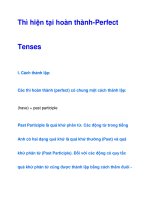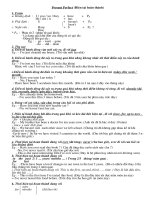THÌ HIỆN tại HOÀN THÀNH ( the present perfect tense)
Bạn đang xem bản rút gọn của tài liệu. Xem và tải ngay bản đầy đủ của tài liệu tại đây (139.04 KB, 6 trang )
THÌ HIỆN TẠI HOÀN THÀNH ( The present perfect tense)
A. Form ( cấu trúc):
a)Thể khẳng định (Afirmative form )(+)
I , We , They, You + have
ed
+ Past participle ( PII)
( PII = V ˂
)
He, She, It
+ has
3
Rút gọn : I’ve /We’ve /You’ve /They’ve
He’s/She’s/It’s
Ex : I have already seen it . (Tôi đã xem nó rồi )
b)Thể phủ định : ( Negative form )(-)
I , We , They, You + have not
+ Past participle ( PII)
He, She, It
+ has not
Rút gọn : have not = haven’t
has not = hasn’t
Ex: I haven’t done my homework yet .( Tôi chưa làm xong bài tập về nhà )
c)Thể nghi vấn( Interrogative form )(?)
Have + I , We , They, You
+ Past participle ( PII)
Has + He, She, It
Ex:Have you ever seen her ? (Bạn đã bao giờ gặp cô ấy chưa ?)
d)Wh-questions
Have + I , We , They, You
Wh +
+ Past participle ( PII)
Has + He, She, It
Ex:What have you done ? ( Bạn đã làm gì ?)
B. Cách dùng ( Use)
-Thì hiện tại hoàn thành diễn tả hành động hoặc sự việc vừa mới xảy ra.
Ex: I have just seen my sister in the park. (Tôi vừa gặp chị tôi ở trong công viên)
She has just finished her homework . ( Cô ấy vừa hoàn thành bài tập)
-Thì hiện tại hoàn thành diễn tả hành động hoặc sự việc xảy ra sớm hơn mong đợi.
Ex:A: Would you like to go to see the film”Finding Dory”with me tonight?
B : Oh,I have already seen it.
( A:Bạn có muốn đi xem phim Finding Dory với mình tối nay không?
B:Oh,tớ đã xem nó rồi )
-Thì hiện tại hoàn thành diễn tả hành động bắt đầu ở quá khứ, kéo dài đến hiện tại và có khả năng
tiếp tục ở tương lai.
Ex: I have lived in this house for 10 years. ( tôi đã sống ở ngôi nhà này được 10 năm)
They have studied English since 1990. ( họ đã hoc tiếng Anh từ năm 1990)
-Thì hiện tại hoàn thành diễn tả hành động được lặp lại lặp đi nhiều lần ở quá khứ và còn có thể lặp
lại ở hiện tại hoặc tương lai.( Diễn tả trải nghiệm của ai đó , có liên quan đến số lần )
Ex: Tom has read that novel several times. ( Tom đã đọc cuốn tiểu thuyêt đó nhiều lần)
I have seen “ Titanic” three times. ( Tôi đã xem phim Titanic 3 lần)
-Thì hiện tại hoàn thành diễn tả hành động hoặc sự việc thường xuyên xảy ra gần đây và có khả
năng tiếp tục ở tương lai :
Ex:. I have been sad so far ( Tôi hơi buồn gần đây.)
-Thì hiện tại hoàn thành diễn tả hành động hoặc sự việc xảy ra trong quá khứ khi người nói không
biết rõ hoặc không muốn đề cập đến thời gian chính xác.
Ex: He has done his housework. ( Cậu ta đã hoàn thành việc nhà)
-Thì hiện tại hoàn thành diễn tả hành động hoặc sự việc xảy ra trong quá khứ nhưng khi nói thì
khoảng thòi gian đó chưa kết thúc.
Ex : I ‘ve visited Da Nang two times this year .( Tôi đã đến Đà Nẵng 2 lần trong năm nay)
I ‘ve done 5 exercises thí morning.( Sáng nay ,tôi đã làm được 5 bài tập )
C. Các phó từ thường đi kèm với thì hiện tại hoàn thành:
+ just: vừa mới.
+ recently,so far, lately, until now ,up to now,up to the present,..: cho đến bây giờ,gần đây
+ never: chưa bao giờ
+ yet: chưa
+ for: trong khoảng thời gian
+ since : từ khi ( thời điểm)
+ ever : đã từng
+ already : rồi
+ before:trước đây
+ this morning/afternoon/evening/week/month/year,today/night,…( lúc nói những thời điểm trên
chưa kết thúc )
+ first /second /most/best/only/worst……… time:lần đầu /lần thứ 2………………..
Exercises
1. Match each verb to its past participle.
be
gone
see
collected
go
lived
do
seen
eat
attended
write
done
live
been
work
written
attend
eaten
collect
worked
2. Write the past simple and the past participle form of the verbs in the box.
Infinitive
Past simple
Past Participle
live
go
see
take
buy
attend
play
meet
be
study
3. Complete the sentences. Use the present perfect or past simple form of the verbs in
brackets.
1. I have lived here since last week.
( live)
2. We …………………….in that restaurant for two yeas.
3. I ……………..……..her since yesterday.
( not eat)
( not see)
4. They ……………..……..Quang Trung school since last.
( attend)
5. My dad …………..…….….for his company for 20 yeas.
( work)
6. Ba ………………….…….stamps since 1995.
7.He is a good writer.He…………. a lot of stories .
8.I ……………this much fun since I ………a kid
( collect)
(write)
( not have)…………..(be)
4. Complete the expressions. Use for or since.
*. For a period of time
*. Since a point of time
- for five months
- since Tuesday.
…………….January
1.
2.
3.
4.
5.
6.
7.
8.
9.
…………five minutes
…….……1990
……………10 weeks
…………the summer
……………Friday
…………three hours
…………..20 years
5. Correct the verb form, using the present perfect tense.
1. I (work) ………………..with him since 1970.
2. She (study) ……………………English for three years.
3. I ( not see) ………………….you for ages.
4. They (live) ……………………there for the whole life.
5. ……………..you (meet) ………………..him since yesterday ?
7. How long …………………you (learn) ……………….French?
- I (learn) ……………………for two years.
8. His girl friend (not get) …………………..in touch with him for years.
6. Write sentences with the cue words. Use the present perfect tense of the verbs.
Ex: 0.I/ know/ her/ three months.
I have known her for three months.
He/ have/ a cold/ a week.
They/ buy/ the new house/ April.
My family/ be/ here/ Christmas.
We/ not see/ each other/ 10 years
Mr. Clark/ work/ in the bank/ a long time.
Tom and Joanna/ go/ to France/ last summer.
My sister/ start/ a new job/ yesterday
I/not eat/in that restaurant/ a long time.
Mr. Robinson/ teach/ in this school/ 1987.
1.
2.
3.
4.
5.
6.
7.
8.
9.
10.
a.
b.
c.
d.
e.
10. I/ write/this letter/six o’clock.
7.Translate into English.
Họ đã đến đây từ tuần trước.
Chúng tôi đã sống ở đây được 15 năm.
Minh đã sử dụng chiếc xe đạp của cậu ấy được 3 năm
.
Bạn đã học tiếng Anh được bao lâu rồi?
-Tôi đã học tiếng Anh từ năm 2004.
Cô ấy đã không liên lạc với tôi 1 tháng nay rồi.
Bố tôi đã làm việc ở nhà máy này được 20 năm.
Họ đã đến Thành Phố Hồ Chí Minh được 3 ngày rồi.
Tôi đã không gặp cô ấy từ hôm qua.
Chúng tôi đã mua cái máy ảnh này từ giáng sinh trước.
Cậu ấy đã làm việc ở công ty FPT từ khi cậu ấy tốt nghiệp đại học. (graduated from
university)
8. Rewrite the sentences , keep the meaning.
It’s three years since I last saw Nam.
I haven’t seen Nam for three years.
We started learning English five years ago.
We have ………………………………………………….
I last wrote to my uncle in July.
I haven’t ……………………………………………………….
The last time she visited me was three months ago.
She hasn’t………………………………………………………………
It’s a long time since we became close friends.
We have ……………………………………………………………..
Minh began to collect stamps in 2000.
Minh has ………………………………………………………..
9. Ask for the information in the underline part of the sentence.
1. I have been in the garden
Where ……………………………………………….
2. My sister has cooked dinner.
Who……………………………………………………
3. My computer has crashed.
What……………………………………………………..
4. Jeane has been on holiday for eight days.
How long ………………………………………….
5. Fred has done his homework.
What…………………………………………….
6. Gavin has stopped at the corner.
Where…………………………………………………
7. Sarah has bought five books.
How many…………………………………………………………..
8. Jason has talked to his teacher.
Who……………………………………………………………
9. Catherine has cleaned the house because she is having a party tonight.
Why…………………………………………









